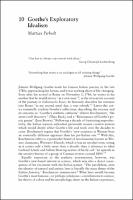Chapter 10 Goethe’s Exploratory Idealism
Proposal review
| dc.contributor.author | Pirholt, Mattias | |
| dc.date.accessioned | 2021-02-02T15:02:24Z | |
| dc.date.available | 2021-02-02T15:02:24Z | |
| dc.date.issued | 2021 | |
| dc.identifier | ONIX_20210202_9781000077247_chpt_43 | |
| dc.identifier.uri | https://library.oapen.org/handle/20.500.12657/46491 | |
| dc.description.abstract | This volume re-examines traditional interpretations of the rise of modern aesthetics in eighteenth-century Britain and Germany. It provides a new account that connects aesthetic experience with morality, science, and political society. In doing so, it challenges long-standing teleological narratives that emphasize disinterestedness and the separation of aesthetics from moral, cognitive, and political interests. The chapters are divided into three thematic parts. The chapters in Part I demonstrate the heteronomy of eighteenth-century British aesthetics. They chart the evolution of aesthetic concepts and discuss the ethical and political significance of the aesthetic theories of several key figures: namely, the third Earl of Shaftesbury, David Hume, and Adam Smith. Part II explores the ways in which eighteenth-century German, and German-oriented, thinkers examine aesthetic experience and moral concerns, and relate to the work of their British counterparts. The chapters here cover the work of Kant, Moses Mendelssohn, Alexander Gottlieb Baumgarten, and Madame de Staël. Finally, Part III explores the interrelation of science, aesthetics, and a new model of society in the work of Goethe, Johann Wilhelm Ritter, Friedrich Hölderlin, and William Hazlitt, among others. This volume develops unique discussions of the rise of aesthetic autonomy in the eighteenth century. In bringing together well-known scholars working on British and German eighteenth-century aesthetics, philosophy, and literature, it will appeal to scholars and advanced students in a range of disciplines who are interested in this topic. | |
| dc.language | English | |
| dc.relation.ispartofseries | Routledge Studies in Eighteenth-Century Philosophy | |
| dc.subject.classification | thema EDItEUR::Q Philosophy and Religion::QD Philosophy::QDH Philosophical traditions and schools of thought::QDHR Western philosophy from c 1800 | en_US |
| dc.subject.classification | thema EDItEUR::Q Philosophy and Religion::QD Philosophy::QDT Topics in philosophy::QDTN Philosophy: aesthetics | en_US |
| dc.subject.classification | thema EDItEUR::D Biography, Literature and Literary studies::DS Literature: history and criticism::DSB Literary studies: general | en_US |
| dc.subject.other | Adam Smith | |
| dc.subject.other | Alexander Gottlieb Baumgarten | |
| dc.subject.other | Anne Pollok | |
| dc.subject.other | aesthetics narrative | |
| dc.subject.other | aesthetic experience | |
| dc.subject.other | autonomy | |
| dc.subject.other | British aesthetics | |
| dc.subject.other | Camilla Flodin | |
| dc.subject.other | David Hume | |
| dc.subject.other | Dorothea von Mücke | |
| dc.subject.other | disinterestednes | |
| dc.subject.other | Emily Brady | |
| dc.subject.other | Friedrich Hölderlin | |
| dc.subject.other | force | |
| dc.subject.other | German aesthetics | |
| dc.subject.other | German romanticism | |
| dc.subject.other | Goethe | |
| dc.subject.other | G.E. Lessing | |
| dc.subject.other | higher enlightenment | |
| dc.subject.other | Jocelyn Holland | |
| dc.subject.other | Johann Joachim Winckelmann | |
| dc.subject.other | Johann Wilhelm Ritter | |
| dc.subject.other | Joseph Addison | |
| dc.subject.other | Karen Green | |
| dc.subject.other | Karl Axelsson | |
| dc.subject.other | Madame de Staël | |
| dc.subject.other | Maria Semi | |
| dc.subject.other | Mattias Pirholt | |
| dc.subject.other | Moses Mendelssohn | |
| dc.subject.other | morality | |
| dc.title | Chapter 10 Goethe’s Exploratory Idealism | |
| dc.type | chapter | |
| oapen.relation.isPublishedBy | 7b3c7b10-5b1e-40b3-860e-c6dd5197f0bb | |
| oapen.relation.isPartOfBook | cda6cf75-c73d-4537-9988-b0fb27dc1bfd | |
| oapen.relation.isPartOfBook | cda6cf75-c73d-4537-9988-b0fb27dc1bfd | |
| oapen.imprint | Routledge | |
| oapen.pages | 22 | |
| peerreview.anonymity | Single-anonymised | |
| peerreview.id | bc80075c-96cc-4740-a9f3-a234bc2598f1 | |
| peerreview.open.review | No | |
| peerreview.publish.responsibility | Publisher | |
| peerreview.review.stage | Pre-publication | |
| peerreview.review.type | Proposal | |
| peerreview.reviewer.type | Internal editor | |
| peerreview.reviewer.type | External peer reviewer | |
| peerreview.title | Proposal review | |
| oapen.review.comments | Taylor & Francis open access titles are reviewed as a minimum at proposal stage by at least two external peer reviewers and an internal editor (additional reviews may be sought and additional content reviewed as required). |

